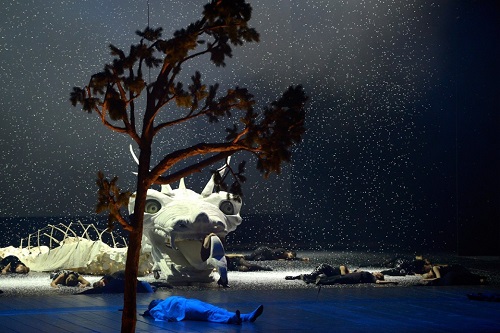 Germany Mozart, Die Zauberflöte: Orchestra and Chorus of the Deutsche Oper Berlin / Nikolas Maximilian Nägele (conductor), Deutsche Oper, Berlin, 23.2.2018. (JMI)
Germany Mozart, Die Zauberflöte: Orchestra and Chorus of the Deutsche Oper Berlin / Nikolas Maximilian Nägele (conductor), Deutsche Oper, Berlin, 23.2.2018. (JMI)

Cast:
Tamino – Attilio Glaser
Pamina – Siobhan Stagg
Papageno – Philipp Jekal
Königin der Nacht – Heather Engebretson
Sarastro – Tobias Kehrer
Sprecher – Seth Carico
Monostatos – James Kryshak
Papagena – Meechot Marrero
First Dame – Kim-Lilian Strebel
Second Dame – Jana Kurucová
Third Dame – Ronita Miller
Priests – Thomas Lehman and Gideon Poppe
Armed Men – Clemens Bieber and Andrew Harris
Production:
Director – Günther Krämer
Sets and Costumes – Andreas Reinhardt
My main interest on this trip to Berlin was the new production of Tristan und Isolde in the renovated Staatsopera Unter den Linden under the baton of Daniel Barenboim. To this was added the opportunity to see L’Arlesiana by Cilea, of which we recognize today little more than the inspired ‘Lamento de Federico’ aria. As an appetizer, there was The Magic Flute at the Deutsche Oper, which turned out to be a very pleasant performance, with an attractive production and strong singers.
This Günther Krämer staging premiered here 27 years ago, and there have now been 338 performances of it in this house. It’s a production that does not pretend to do more than narrate a tale, and it does that perfectly. The stage has few fixed elements beyond a tree at the front of the stage; everything else is mobile and well- handled by extras, from the appearance of the great serpent to the trials of fire and water. The costumes are traditional and appropriate.
The musical direction was in the hands of the young German conductor Nikolas Maximilian Nägele, whom I never had the opportunity to see in a pit until now. He made a very good impression: a great knowledge of the work and a fine rhythm. He drew a superior performance from both the Deutsche Oper Orchestra and the Chorus.
Tenor Attilio Glaser as Tamino has an attractive voice, one that is well-suited to the character. Pamina was sung by Australian soprano Siobhan Stagg, an appealing interpreter who sang her arias with gusto.
The part of Papageno was to have been sung by Simon Pauly, but he cancelled and was replaced by 25-year-old Philipp Jekal, who turned out to be an amazing performer with a dramatic and vocal maturity that is more than remarkable. We will be hearing from him in future.
Soprano Heather Engebretson was a convincing Queen of the Night, who sang her two arias brilliantly and showed strong coloratura. Bass Tobias Kehrer replaced Ante Jerkunica in the part of Sarastro, and once again he demonstrated his important voice, one perfectly suited to the demands of the score, and with perfectly placed low notes. Baritone Seth Carico was also good as Speaker, as was Meechot Marrero as Papagena.
The Ladies of the Queen of the Night were excellent: soprano Kim-Lilian Strebel and mezzo-sopranos Jana Kurucová and Ronita Miller. The Three Boys, played by soloists from the Knabenchor of Dortmund, were also terrific.
The two priests were well served by Thomas Lehman and Gideon Poppe. Finally, the two Armed Men were Clemens Bieber and Andrew Harris, both perfectly suited to their parts.
José Irurzun